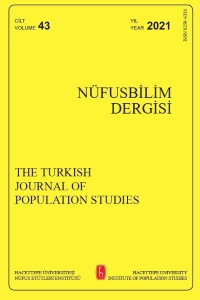KOMŞUDAN YABANCIYA, MİSAFİRDEN MÜLTECİYE: YEREL HALKIN GÖZÜNDEN TÜRKİYE’DE MÜLTECİLER
Bu çalışma, ev sahibi topluluğun Ankara’daki günlük ilişkilerinde mültecilere yönelik hikayeleri ve algıları üzerine kurulmuştur. Ev sahibi topluluğun mültecilere yönelik bakış açılarını ortaya koymayı amaçlayan araştırmanın saha çalışması Ankara’nın Altındağ ilçesinde Iraklı Türkmen mültecilerin yerleştiği Abidinpaşa mahallesinde yapılmıştır. Ev sahibi topluluğun mültecilere bakışı Simmel’in “yabancı” kavramından yola çıkılarak, Park’ın “marjinal adam”, Siu’nun ‘misafir’ ve Bauman’ın “yabancı” kavramları temel alınarak analiz edilmiştir. Türkiye’de resmi söylemin de etkisiyle ev sahibi topluluk mültecileri geçici olarak görmekte ülkelerindeki çatışmalı ortam sona erdiğinde geri döneceklerini farzetmektedir. Ancak mültecilerin Türkiye’deki kalış süresi uzadıkça, bazı mülteci grupların kabulünü kolaylaştıran “din kardeşliği”, “soydaşlık” gibi kavramlar zedelenmeye başlamıştır. Çalışma, ev sahibi topluluğun gözünde mültecilerin “yabancı”ya dönüşme ve marjinalleştirilme süreçlerine odaklanmaktadır. Mültecilerin “yabancı” ve/veya “misafir” olarak olarak tanımlanması “biz” ve “onlar” ayrımını daha belirgin hale getirerek iki topluluk arasına pek çok konuda sınır çizilmesine neden olmaktadır.
Anahtar Kelimeler:
Mülteciler, göç, Iraklı Türkmenler, toplumsal kabul, yabancı
FROM CONSANGUINE TO STRANGER, FROM GUEST TO REFUGEE: REFUGEES IN TURKEY FROM THE EYES OF THE LOCAL PEOPLE
This study is based on the stories and perceptions of the local people about the refugees in their daily relationships in Ankara. With an aim to reveal the local people’s perspective about the refugees, the fieldwork of this study was carried out in Abidinpaşa District, where the population of Iraqi Turkmens is concentrated in Ankara. The local people’s perspectives about the refugees are analyzed based on Simmel’s concept of “stranger”, and relying on Park’s “marginal man”, Siu’s “sojourner”,
and Bauman’s “stranger”. Related to the official discourse produced about refugees in Turkey, the local people consider the refugees as temporary and assume that they will go back to their country when the conflict is over there. The concept of “consanguinity”, which facilitates the acceptance of the Iraqi Turkmens by the local people, is harmed since these people’s stay in Turkey extends. Thus, this study focuses on the processes of transformation of the Iraqi Turkmens into “strangers” and their marginalization in the eyes of the local people. The definition of the refugees as “stranger” and/or “guest” leads to the crystallization of the division between “us” and “them”, and sets various borders between the two groups in many ways.
Keywords:
Refugees, migration, Iraqi Turkmens, social acceptance, Simmel's stranger,
___
- Aukot, E. (2003). “It is Better to be a Refugee Than a Turkana in Kakuma”: Revisiting the Relationship between Hosts and Refugees in Kenya. Global Movements for Refugees and Migrant Rights, Vol. 21, No. 3, pp. 73-83. https://pi.library.yorku. ca/ojs/index.php/refuge/article/viewFile/23482/21678
- ISSN: 0259-6334
- Başlangıç: 1979
- Yayıncı: Hacettepe Üniversitesi
Sayıdaki Diğer Makaleler
Helga RITTERSBERGER-TILIÇ, Sevil BAL
HAYATİ KAYITLARDAN TÜRKİYE İÇİN HAYAT TABLOSU n ax DEĞERLERİNİN HESAPLANMASI: 2010-2018
Zehra YAYLA ENFİYECİ, İsmet KOÇ
GECEKONDU MAHALLELERİNDE SÜREĞEN GÖÇMENLİK HALLERİ: LİMONTEPE ÖRNEĞİ
TÜRKİYE’DE GÖÇÜN DEĞİŞEN YAPISI KAYNAKLI İKİ OLGU
KOMŞUDAN YABANCIYA, MİSAFİRDEN MÜLTECİYE: YEREL HALKIN GÖZÜNDEN TÜRKİYE’DE MÜLTECİLER
